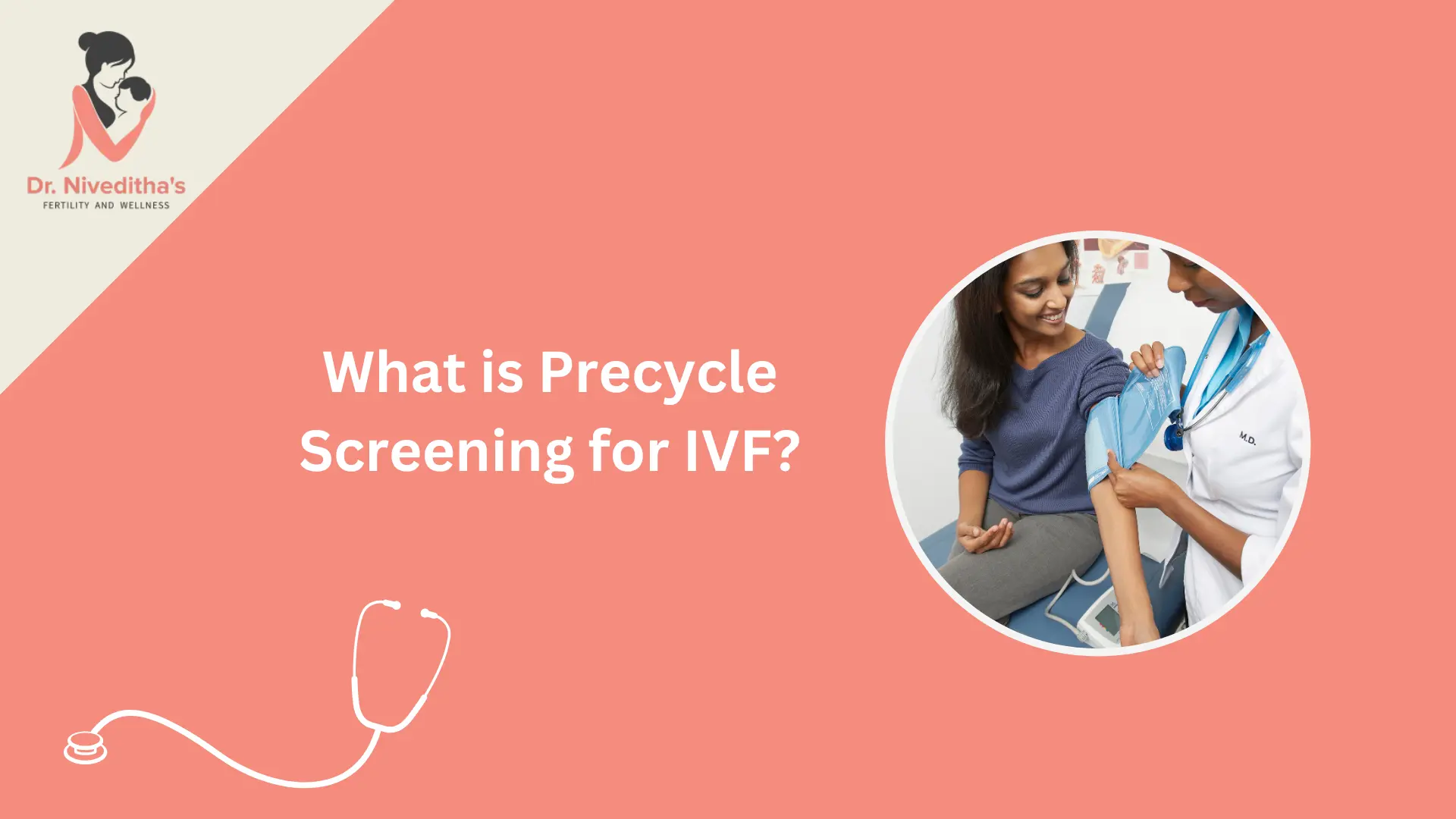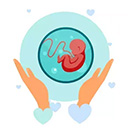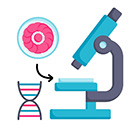What Is Precycle Screening for IVF?
If you’re thinking about in vitro fertilization (IVF), you’ve probably heard the term “precycle screening” floating around. It might sound like just another step in an already overwhelming process, but it’s actually a key part of setting yourself up for success. So, what exactly is precycle screening, and why does it matter? Picture it as the foundation of your IVF journey—like checking the soil before planting a garden. You want to make sure everything’s ready to grow.
In this article, we’ll dive deep into what precycle screening involves, why it’s so important, and how it can make a difference in your IVF experience. Whether you’re just starting to explore fertility treatments or you’re already knee-deep in the process, this guide will give you a clear, friendly rundown—plus some fresh insights you won’t find everywhere else.
Why Precycle Screening Is Your IVF Starting Line
Before any needles, medications, or embryo transfers come into play, precycle screening is the first big step. It’s a series of tests and evaluations that doctors use to get a full picture of your health—and your partner’s, if applicable—before starting IVF. Think of it as a personalized roadmap. Without it, you’d be driving blind, hoping to stumble into a successful pregnancy.
The goal? To spot anything that could affect your chances of conceiving or carrying a baby to term. It’s not just about finding problems—it’s also about tailoring the IVF process to your unique body. Doctors want to know your hormone levels, your reproductive organs’ condition, and even how your lifestyle might play a role. This isn’t a one-size-fits-all deal; it’s about you.
Studies show that thorough precycle screening can boost IVF success rates by identifying issues early. For example, a 2020 study in Fertility and Sterility found that couples who completed comprehensive precycle evaluations had a 15% higher chance of a live birth compared to those who skipped some tests. That’s a big deal when you’re investing time, money, and emotions into this journey.
What Happens During Precycle Screening?
So, what’s actually involved? Precycle screening isn’t just one test—it’s a collection of checks that cover different angles of your fertility and overall health. Here’s a breakdown of what you can expect:
Blood Tests: The Inside Scoop
Blood work is a huge part of precycle screening. These tests measure hormone levels that affect ovulation, egg quality, and your body’s ability to support a pregnancy. Common ones include:
- FSH (Follicle-Stimulating Hormone): Shows how well your ovaries are responding.
- AMH (Anti-Müllerian Hormone): Gives a clue about your ovarian reserve—aka how many eggs you’ve got left.
- Estradiol: Helps doctors understand your baseline hormone levels.
- Thyroid Function: An underactive or overactive thyroid can mess with fertility.
For example, if your AMH is low, it doesn’t mean IVF won’t work—it just means your doctor might adjust your medication to stimulate more eggs. Real-life tip: Ask for a copy of your results. Seeing the numbers can help you feel more in control.
Imaging: A Peek at Your Reproductive System
Next up, you’ll likely have some imaging done. This is where doctors check out your uterus and ovaries to make sure everything’s in good shape.
- Ultrasound: A quick scan to count antral follicles (potential eggs) and look for cysts or fibroids.
- Hysterosalpingogram (HSG): A special X-ray to see if your fallopian tubes are open (though this is less common for IVF since the tubes are bypassed).
Fun fact: Some clinics now use 3D ultrasounds for a more detailed view. It’s like upgrading from a flip phone to a smartphone—way more clarity.
Semen Analysis: The Other Half of the Equation
If you’re using a partner’s sperm, they’ll need a semen analysis. This checks sperm count, motility (how well they swim), and morphology (their shape). Even if you think everything’s fine, this test can uncover surprises. One couple I heard about found out the husband’s sperm motility was low due to a vitamin D deficiency—something they fixed with a simple supplement before IVF.
Infectious Disease Screening: Safety First
Both partners get tested for things like HIV, hepatitis B and C, and syphilis. This isn’t about judgment—it’s about keeping everyone safe, including the baby. Clinics also want to avoid cross-contamination if embryos are stored.
Lifestyle Check-In: More Than Just Medical
Your doctor might ask about smoking, alcohol, stress, or even your caffeine habits. These don’t always show up in a test, but they can impact IVF. A 2023 study from the Journal of Assisted Reproduction found that women who cut caffeine to under 100 mg daily (about one small coffee) had a 10% higher implantation rate. Small changes, big results.
How Precycle Screening Boosts Your IVF Success
You might be wondering: “Do I really need all this?” The short answer is yes—and here’s why. Precycle screening doesn’t just check boxes; it actively improves your odds. Let’s break it down:
Catching Hidden Issues
Sometimes, fertility challenges aren’t obvious. Maybe you have a uterine polyp (a growth that can prevent implantation) or a thyroid issue you didn’t know about. Finding these early means you can fix them before starting IVF. One woman shared online that her precycle screening revealed a small polyp—removed in a quick procedure, she got pregnant on her first IVF try.
Customizing Your Treatment
IVF isn’t a cookie-cutter process. If your hormone levels are off or your ovarian reserve is lower than average, your doctor can tweak your protocol. For instance, a “long protocol” with extra suppression might work better for some, while others do great with a “short protocol.” Precycle screening gives your team the data to decide.
Reducing Risks
Untreated infections or genetic conditions could harm you or the baby. Screening catches these risks early. Plus, it helps avoid wasted cycles—imagine going through IVF only to miscarry because of something preventable.
The Emotional Side of Precycle Screening
Let’s be real: IVF can feel like an emotional rollercoaster. Precycle screening might add to that, especially if you’re nervous about what the results might show. But here’s a silver lining—it’s also empowering. Knowing where you stand takes away some of the guesswork. You’re not just hoping; you’re planning.
Try this: Write down three questions you have about your results before your follow-up appointment. It could be “What does my AMH mean for me?” or “Can I improve my egg quality?” Having a list keeps you focused and less overwhelmed.

Interactive Quiz: What’s Your Precycle Prep Style?
Take a quick break and see how you’re approaching this step! Answer these questions and tally your “yes” answers:
- Have you researched what tests you might need?
- Are you planning to ask your doctor about your results?
- Do you track your cycle or symptoms already?
- Are you open to tweaking your diet or habits if needed?
- 0-1 Yes: You’re just getting started—totally normal! Use this article as your guide.
- 2-3 Yes: You’re on the ball and ready to dive in.
- 4 Yes: You’re a precycle pro—keep that energy going!
Three Things You Haven’t Heard About Precycle Screening
Most articles cover the basics, but there’s more to this process than meets the eye. Here are three under-the-radar insights that can change how you approach it:
1. Your Gut Health Might Matter More Than You Think
Emerging research is linking gut health to fertility. A 2024 study in Nature Reproductive Medicine found that women with a balanced gut microbiome had a 12% higher IVF success rate. Why? Inflammation from an unhealthy gut can mess with hormone levels and egg quality. Doctors don’t always test this, but you can ask about it—or start eating more probiotic-rich foods like yogurt or kefir now.
2. Stress Testing Isn’t Standard (But It Should Be)
Chronic stress can lower IVF success by affecting cortisol levels, yet most precycle screenings skip a formal stress assessment. A small 2023 pilot study showed that women who did a stress management program before IVF had a 20% higher pregnancy rate. Tip: If you’re a worrier, mention it to your doctor. They might suggest mindfulness or even a cortisol test.
3. Genetic Screening Is Evolving Fast
Basic genetic tests check for conditions like cystic fibrosis, but newer options—like expanded carrier screening—look at hundreds of genes. This isn’t routine yet, but it’s gaining traction. One couple I read about discovered they both carried a rare gene mutation; they opted for preimplantation genetic testing (PGT) during IVF and had a healthy baby. Ask your clinic what’s available—it could be a game-changer.
Precycle Screening Myths—Busted!
There’s a lot of noise out there about precycle screening. Let’s clear up some common misconceptions:
- Myth: “It’s just a formality—I don’t need it if I feel fine.”
Truth: Feeling good doesn’t mean everything’s perfect inside. Silent issues like low ovarian reserve won’t show up without testing. - Myth: “It’s too expensive to bother with.”
Truth: Many insurance plans cover at least part of it, and catching problems early can save you from failed cycles (which cost way more). - Myth: “It takes forever.”
Truth: Most screenings wrap up in a week or two, depending on your clinic’s schedule.
Your Precycle Screening Action Plan
Ready to take charge? Here’s a step-by-step guide to make the most of this phase:
Step 1: Schedule It Early
Call your clinic as soon as you decide on IVF. Some tests need to happen on specific cycle days (like Day 3 for FSH), so timing matters.
Step 2: Prep Your Body
- ✔️ Hydrate before blood tests—it makes veins easier to find.
- ✔️ Skip heavy exercise the day before imaging; it can affect ovary visibility.
- ❌ Don’t fast unless told to—most tests don’t require it.
Step 3: Bring Your Partner In
If you’re using a partner’s sperm, their screening is just as crucial. Make it a team effort—schedule together if you can.
Step 4: Follow Up Like a Boss
After results come in, book a consult to go over them. Bring your questions and a notebook. This is your chance to understand what’s next.

Real Stories: How Precycle Screening Made a Difference
Sometimes, hearing from others makes it click. Here are two quick examples:
- Jenna, 34: “My AMH was lower than expected, but my doctor adjusted my meds based on the screening. First cycle worked—now I’ve got twins!”
- Mark, 39: “Semen analysis showed my count was off. A few months of diet changes, and we were ready. Our daughter’s 2 now.”
These aren’t just happy endings—they’re proof that screening can pivot your path.
Poll: What’s Your Biggest Precycle Question?
We want to hear from you! Pick one and comment below (or just think about it):
- A) How do I improve my results?
- B) What if something’s wrong?
- C) How long will this take?
- D) Other—tell us!
Your answer might spark a future post, so don’t be shy.
The Latest Buzz: What’s New in Precycle Screening?
Fertility science moves fast, and precycle screening is no exception. Here’s what’s trending in 2025 based on recent chatter and research:
- AI-Powered Analysis: Some clinics are using artificial intelligence to predict IVF outcomes from screening data. A 2024 trial showed AI could spot patterns humans missed, upping success rates by 8%.
- At-Home Testing Kits: Basic hormone tests you can do yourself are popping up. They’re not a full replacement, but they’re a handy first step.
- Focus on Male Fertility: More studies are highlighting how men’s health—like exposure to pollutants—affects IVF. Expect deeper semen screening soon.
A Deeper Dive: The Science Behind the Tests
Want to geek out a bit? Let’s unpack the why behind some key tests:
AMH and Ovarian Reserve
AMH is like a fuel gauge for your ovaries. It drops with age—around 1% per year after 30, per a 2022 Reproductive Biology study. Low AMH doesn’t doom you; it just signals fewer eggs to work with. Doctors might push for a higher dose of stimulation meds to max out your chances.
Thyroid and Pregnancy
Your thyroid’s a tiny gland with a big job: regulating metabolism. If it’s off, it can disrupt implantation. A 2023 Endocrinology report found that women with subclinical hypothyroidism (mildly off levels) had a 25% lower IVF success rate—fixable with meds.
Sperm DNA Fragmentation
This isn’t standard yet, but it’s gaining steam. High fragmentation (damaged sperm DNA) can lead to miscarriage. A 2024 study showed that men who took antioxidants for three months cut fragmentation by 15%, boosting outcomes.
Precycle Screening Around the World
Here’s a fun twist: Precycle screening isn’t the same everywhere. In the U.S., it’s pretty thorough—blood, imaging, the works. In Europe, some countries skip extras like genetic screening unless there’s a family history. Japan’s big on infectious disease checks due to strict embryo storage rules. Wherever you are, ask your clinic what’s standard—and what’s optional.

Your Precycle Power Moves: Tips You Won’t Find Elsewhere
Most guides stop at “get tested.” Let’s go further with some unique hacks:
- Track Your Sleep: Poor sleep tanks hormone balance. Aim for 7-8 hours a night in the month before screening—your FSH will thank you.
- Try a Fertility Smoothie: Blend spinach, berries, and flaxseed. It’s packed with folate and antioxidants, which early research links to better egg quality.
- Ask About Timing: Some clinics rush screening into one cycle. If you’re stressed, spread it over two—it won’t delay IVF much but could ease your mind.
Wrapping It Up: Your IVF Journey Starts Here
Precycle screening might feel like a hurdle, but it’s really a launchpad. It’s your chance to get answers, fix what you can, and step into IVF with confidence. You’re not just a patient—you’re a partner in this process. So, take a deep breath, grab your calendar, and start this chapter strong.
Got questions? Drop them below or chat with your doctor. You’ve got this—and precycle screening’s got your back.







